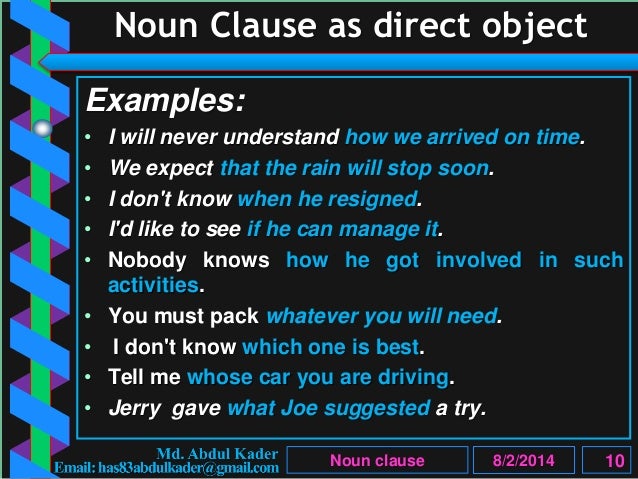What Is Noun Clause - How does a noun and a subject differ? - Quora - • noun clauses what's a noun clause?. For example, if the sentence asks do you know what time we are leaving? the noun clause is what time we are leaving? you can't easily substitute a noun here. Noun clauses can function as subjects, objects, or complements. Question words like what, how, when etc., can also be used to introduce noun clauses. Noun clauses come after the words such as how, that, what, whatever, when, where, whether, which, whichever, who, whoever, whom, whomever , and why. I'm elizabeth o'brien, and my goal is to get you jazzed about grammar.
Noun clauses are a type of subordinate clause. It must always be paired with an independent (main) clause. A noun clause refers to a clause that serves the same purpose as a noun and is usually dependent. A noun clause is a dependent clause that contains a subject and a verb. Noun clauses begin with words such as how, that, what, whatever, when, where, whether, which, whichever, who, whoever, whom, whomever , and why.

This page has lots of examples of noun clauses and an interactive exercise.
Why he did that is a mystery. What is a noun clause? The noun clause is a clause that functions like a noun in the sentence. • noun clauses what's a noun clause? In this case, the clause is identifying what it is. However, it cannot stand alone as a sentence. A noun clause starts with a conjunction like that, what, who, which, how, why, whom, whose, when, where, whether, whenever, wherever, whichever, if … a noun clause precisely). Remember that a noun names a person, place, thing, or idea. Noun clauses generally begin with words such as how, that, what, whatever, when, where, whether, which, whichever, who, whoever, whom, whomever, and why. It can be used as the subject, direct object, indirect object, object of a preposition, subject complement, or appositive. This is just a recap for what we have seen in the previous lesson about the dependent an independent clause. What you think does not matter. A noun clause is a dependent clause that acts as a noun.
A noun clause is always a dependent clause, meaning it's a part of the sentence that can't stand on its own as an independent thought. It generally functions as an appositive, the in the examples above, what caused the fire and how i get home are noun clauses which function as the complement of the subjects, the. A noun clauses can begin with … 1. It might be a noun clause. The two forms of noun clauses in the english language are finite noun clauses and nonfinite noun clauses.

Noun clauses are a type of subordinate clause.
It must always be paired with an independent (main) clause. The noun clause is a clause that functions like a noun in the sentence. A clause is a group of words containing a subject and a verb. What does noun clause mean? What is a noun clause? I have a surprise for whoever wins the race. Noun clauses replace nouns, and this tutorial shows how. It can be the subject of a sentence, an object, or a complement. A noun clause functions as noun in a sentence. It can be used as the subject, direct object, indirect object, object of a preposition, subject complement, or appositive. Whether he will attend or not. Why he did that is a mystery. A noun clause is a group of words that contains a subject and a verb;
A noun clause refers to a clause that serves the same purpose as a noun and is usually dependent. It can be the subject or object of a verb. He talked about what he had said. Since it is a dependent clause, it cannot stand alone as a sentence. I'm elizabeth o'brien, and my goal is to get you jazzed about grammar.

What is a noun clause?
The two forms of noun clauses in the english language are finite noun clauses and nonfinite noun clauses. A noun is the name of a person, place, thing, or idea. You don't want to know what karen has planned to trick the boys. Noun clauses can function as subjects, objects, or complements. A noun clause or nominal clause is a dependent or subordinate clause that does the work of a noun in a sentence. A noun clause (also called nominal clause ) is a dependent clause that plays the role of a noun. What she wore to the party. Noun clauses are a type of subordinate clause. He talked about what he had said. A noun clause refers to a clause that serves the same purpose as a noun and is usually dependent. Noun clauses can act as subjects, direct objects, indirect objects, predicate nominatives. What is a noun clause? A noun clause cannot stand alone because it is not a complete thought.

0 Komentar